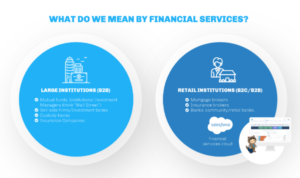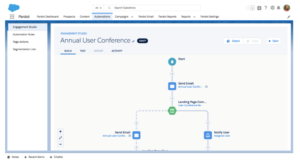How Does Salesforce Help Finance Industry Services?
As Salesforce moves into more industry-specific offerings, financial firms discovered increasing benefits for moving their tech stack into the Salesforce ecosystem. So, how does Salesforce help financial industry services specifically?
When the COVID-19 pandemic hit, financial services needed new ways to automate processes and move into the digital world much quicker. Not only did financial institutions need to prepare for a remote workforce, but many needed to provide remote financial services.
For example, in the United States, the federal government authorized up to $659 billion towards helping small to medium-sized businesses (SME) during the financial crisis caused by the pandemic. Financial institutions needed a platform to help these businesses apply for the payroll protection program (PPP). Salesforce provided those very tools to their financial services customers.
PPP automation forms are only one of the ways Salesforce helped the financial industry with its daily operations. There are significant advantages for financial firms to adopt Salesforce integration. Here’s how this leading CRM platform can help financial industry services.
What is Financial Services Cloud?
Financial Services Cloud is a Salesforce platform to meet the needs of asset managers, insurers, wealth management firms, and commercial and retail banks. With this Salesforce offering, you can scale up, create self-service tools for customers, offer financial guidance, and process claims faster.
Financial Service Cloud allows you to build a seamless customer experience for each client and increase employee productivity. Your firm can also use it to understand performance metrics with the assistance of artificial intelligence all from one platform.
There are two types of financial industry services. Large institutions in the B2B sector and financial institutions that focus on the general public. Financial Services Cloud is geared more towards the B2C sector.
Benefits of Salesforce for the Financial Industry
Many of the benefits of Salesforce Financial Services Cloud are the same as CRMs in general. Financial institutions do many of the same back-office tasks of other industries regarding record-keeping.
The first few benefits on this list refer to Salesforce CRM for all industries. Yet, the last two are specific to the financial services industry.
- User Experience: When it comes to the tech Salesforce provides in all their offerings it is unmatched by any of their competition. They hold the thought leadership role of all the CRM platforms on the market.
- Integrations: There are many products beyond the core Salesforce offerings and financial firms can also benefit from all that they have to offer customers. Automated marketing tools, Experience Cloud, and Einstein are just a few tools for financial industry services.
- Salesforce Community Resources: The Salesforce community is vast. The wide array of talent, knowledge, and other resources available online, over the phone, or in person is innumerable. The community keeps expanding as Salesforce continues to grow.
- Customer Experience: Customers can do more for themselves and have direct access to tools like never before. Loan origination and processing can be automated. Financial Services Cloud is user-friendly, seamless, and keeps your firm on brand.
- Risk Management: Salesforce Financial Service Cloud helps financial firms manage risk better by providing better security and data management.
What the Financial Services Industry Needs to Consider About the Salesforce Ecosystem
CRMs are nothing new to the financial services industry. You may already be using some of the Salesforce offerings like Sales Cloud, Marketing Cloud, and Pardot, to name a few. Their system may sit within a larger context of applications in your tech stack.
Here is what to consider about integrating Salesforce Financial Cloud:
Understand how the technology is integrated
You don’t have to be an IT administrator to understand how the technology integrates into your existing infrastructure. Yet, many integrations require coding knowledge, and you probably don’t have someone on board to manage these complexities. So, you may need to hire an expert either internally or outsource the job of integrating Salesforce Financial Cloud.
Identify customer opportunities
By integrating Salesforce Financial Cloud, not only do you provide your staff with a better user experience, but you also do the same for your customers. In the Salesforce ecosystem, your customers or clients can use self-service tools for many of their financial needs.
- How will people access this data?
- How will they use it?
- How will people interact with the tools?
These are some imperative questions to work out with whoever will build your tech stack into your existing IT infrastructure.
Think about ongoing ownership of the system
The last thing to consider is understanding what you need in a support model. Your staff knows finances. Do they know how to develop a tech stack? Who will retain ownership over the system?
There are different roles within the program. What is the staffing going to look like? Who manages these Salesforce ecosystem roles? Will you hire a Salesforce admin? You will have to decide if you will hire in-house or outsource to a managed services provider.
You Need Skilled Professionals to Manage Your Salesforce Integration
Most financial firms need Salesforce to help them move into the digital transformation age of automating tasks to create more efficient workflow processes. It allows them to provide better customer service, manage risk, and move into the future of financial services. Many will need a managed service provider to integrate Salesforce into their tech stack.
At Rainmaker, we have the expertise you need. You know the financial industry. We know the Salesforce tech stack. Our professional consultants can help you understand how Salesforce Financial Cloud can benefit your firm and the best ways to integrate it into your tech stack.
Are looking to integrate Salesforce Financial Cloud at your firm? Contact us here at Rainmaker to see how our managed service consultants can help.








